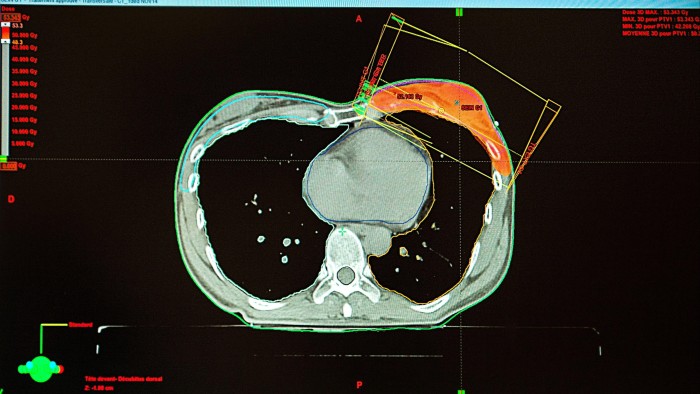Gene screening can cut early disease deaths by 25%, study shows

Unlock the Editor’s Digest for free
Roula Khalaf, Editor of the FT, selects her favourite stories in this weekly newsletter.
A simple genetic screening test has the potential to stop almost a quarter of premature preventable deaths from common diseases including breast cancer, diabetes and hypertension by identifying those most at risk, according to new research.
The genetic warning signs would allow health authorities to offer vulnerable groups earlier investigation and treatment, according to the study published on Wednesday by Stanford University researchers and UK-based healthcare company Genomics.
The work highlights how vast databanks of personal genetic information are transforming scientists’ ability to spot features that make people prone to deadly conditions. Earlier interventions in such cases could improve public health and save money that would otherwise be spent on treating acute illnesses.
“We are excited about the potential of genomics in addressing the significant public health challenge of premature mortality,” said Jack W O’Sullivan, study co-author and cardiovascular medicine postdoctoral fellow at Stanford Medicine. “By leveraging genomics, we envision a future where patients can experience more personalised care.”
The research, first presented at the American Society of Human Genetics annual meeting last week, analysed health information from the UK Biobank genetic database of more than 400,000 people.
The scientists used Genomics’ analytical tool, known as a polygenic risk score (PRS), to identify those at high risk from birth of nine diseases. The conditions, which all have existing screening programmes globally, are breast cancer, prostate cancer, colorectal cancer, abdominal aortic aneurysm, melanoma, type 2 diabetes, hypertension, cardiovascular disease and atrial fibrillation.
The researchers found very high risk individuals reached the average risk levels on which screening programmes are based 12.4 years early. In other words, if a screening programme were devised on the basis of the average risk facing a 50-year-old, this high-risk group would face the same predicted risk at age 37.6. By contrast, a group of reduced genetic risk individuals did not reach normal initial screening-age risk levels until about 17.7 years later — or 67.7 years old in the example given.
Overall, the use of the genetic prediction tools and consequent early medical intervention could prevent 24.5 per cent of premature, preventable deaths that occur before screening programmes start, the researchers said. The recommendations for earlier screening for very high-risk groups ranged from four years in advance for abdominal aortic aneurysm to 22 years for hypertension.
“Knowledge of genetic risk, measured using PRS, has the potential to deliver substantial public health benefits and can prevent significant premature mortality by tailoring existing screening programmes,” said Professor Sir Peter Donnelly, paper co-author and Genomics’ founder and chief executive.
The study adds to evidence in support of increased use of genetics in disease risk prediction by health authorities and insurers. More countries are now setting up genetics databases to harness the power of this mass of information and the disease patterns it reveals.
The latest study presented a “credible and important” case for why a simple genetic predictive test covering multiple common conditions “could and should be used”, said Timothy Frayling, professor of human genetics at the University of Geneva.
“There is no doubt that if, for example, a woman has a high background genetic risk of breast cancer, she would benefit from earlier screening,” said Frayling, who wasn’t involved in the research. “If we are going to screen at all, it makes little scientific and healthcare sense not to add in a simple, cheap additional marker.”
The genetic information raised a “tricky question” of whether someone with low background risk should be screened later than at present, Frayling noted. The research’s estimates of the risk differentials between the various groups of people it analysed would also need to be tested and validated in further studies, he added.
#Gene #screening #cut #early #disease #deaths #study #shows







